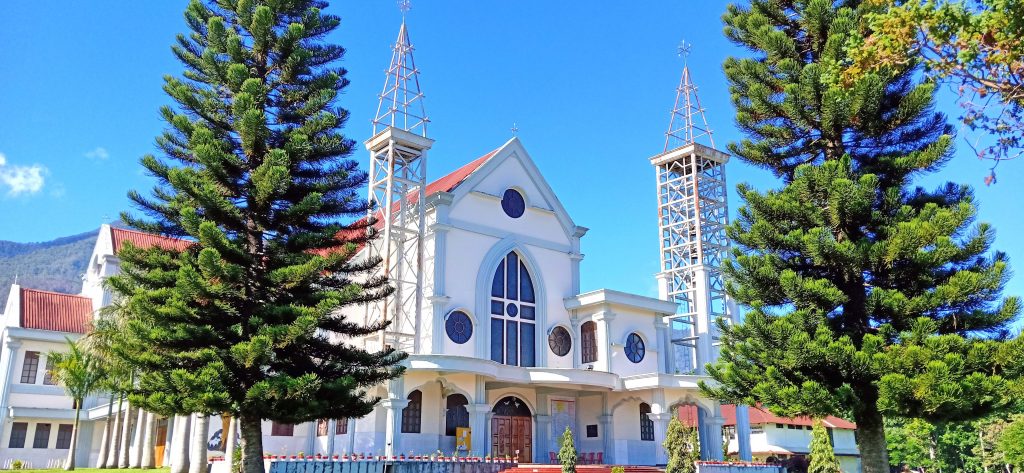The Diocese of Ruteng, located on the island of Flores, has earned the reputation as the “promised land” of Catholic vocations, according to Agenzia Fides.
With a Catholic population of 800,000 out of one million inhabitants, Ruteng stands out as the largest Catholic diocese in Indonesia, a predominantly Muslim nation of 17,000 islands.
Known as the “diocese of a thousand congregations,” Ruteng boasts a robust presence of religious institutes, social works, schools, and seminaries.
This strong religious foundation has even drawn the attention of Pope Francis, who in 2022, referred to Flores as a potential source of vocations for the global Church, stating off the cuff, “faced with the crisis in vocations, one could go ‘to the island of Indonesia (Flores, in fact)’ to find them.”
In an interview with Agenzia Fides, Bishop Ciprianus Hormat of Ruteng highlighted the vibrant seminary life in the region.
“In the minor seminary of Ruteng, we have 450 boys, while in the nearby diocese of Labuan Bajo, recently separated from Ruteng, there are 350. Many boys want to enter every year,” the Bishop said.
He noted that although the seminaries are primarily strong middle schools, they remain “a place where faith is cultivated and vocational discernment is done.”
Bishop Hormat further explained the natural progression of vocations in the diocese. “It is true and physiological that the percentage of those who continue the journey from the minor seminary to the major seminary is 40 or 50 percent, but it is right that it be so,” he said.
The prelate added that the boys “must listen to and explore God’s will in their lives and follow their path. In any case, these are important years for human and Christian formation, a heritage that they carry with them for life.”
The diocese’s pastoral landscape is equally impressive, with 85 parishes, 212 diocesan priests, and over 200 religious priests, as well as more than 1,000 consecrated women from around 50 congregations of female religious.
“Faith is alive here, and for that, we thank the Portuguese and Dutch missionaries who brought and preached the Gospel in all the villages,” said Bishop Hormat, adding that the local Church has been self-sufficient since 1991.
In addition to its religious impact, the Catholic Church in Ruteng is also a major player in education. “There are 265 elementary schools and 20 high schools in the diocese attended by thousands of students, in addition to many other educational works. Historically, the Church has been an institution that promotes quality education here, and the first schools established in the region were Catholic,” the Bishop remarked.
The recent completion of the Catholic University of San Paolo is seen as a key milestone. “It has quickly become a crucial point of reference for our young people,” Bishop Hormat noted.
Ruteng’s wealth of vocations extends beyond its borders. The diocese actively participates in Indonesia’s “missio domestica” program, sending priests to under-served regions such as Papua, Sumatra, and Borneo.
“We put this wealth at the service of the Church in Indonesia and the universal Church,” the Bishop said. Ruteng priests also serve in Europe, including Switzerland, Austria, and Italy.
There is a special pastoral agreement with Holland, which allows Ruteng priests to work in the Netherlands for a few years before returning home as fidei donum priests.
“The gift of vocations to the priesthood and consecrated life is always a mystery: it is God who calls,” Bishop Hormat emphasized. “Accompanying young people to the priesthood is not just for us, but for the benefit of the entire ecclesial community, including Europe.”
Ruteng’s ongoing commitment to the global Church is rooted in its historical ties to Dutch missionaries. Bishop Hormat fondly remembered the last Dutch bishop to serve Ruteng, Verbite Wilhelm van Bekkum, who led the diocese from 1951 to 1972.
“The memory of the good work done by the last Dutch bishop is still alive in our hearts. We express our gratitude today by continuing the work of these missionaries,” he said, echoing Pope Francis’ call for an “open, missionary, outgoing Church.”







